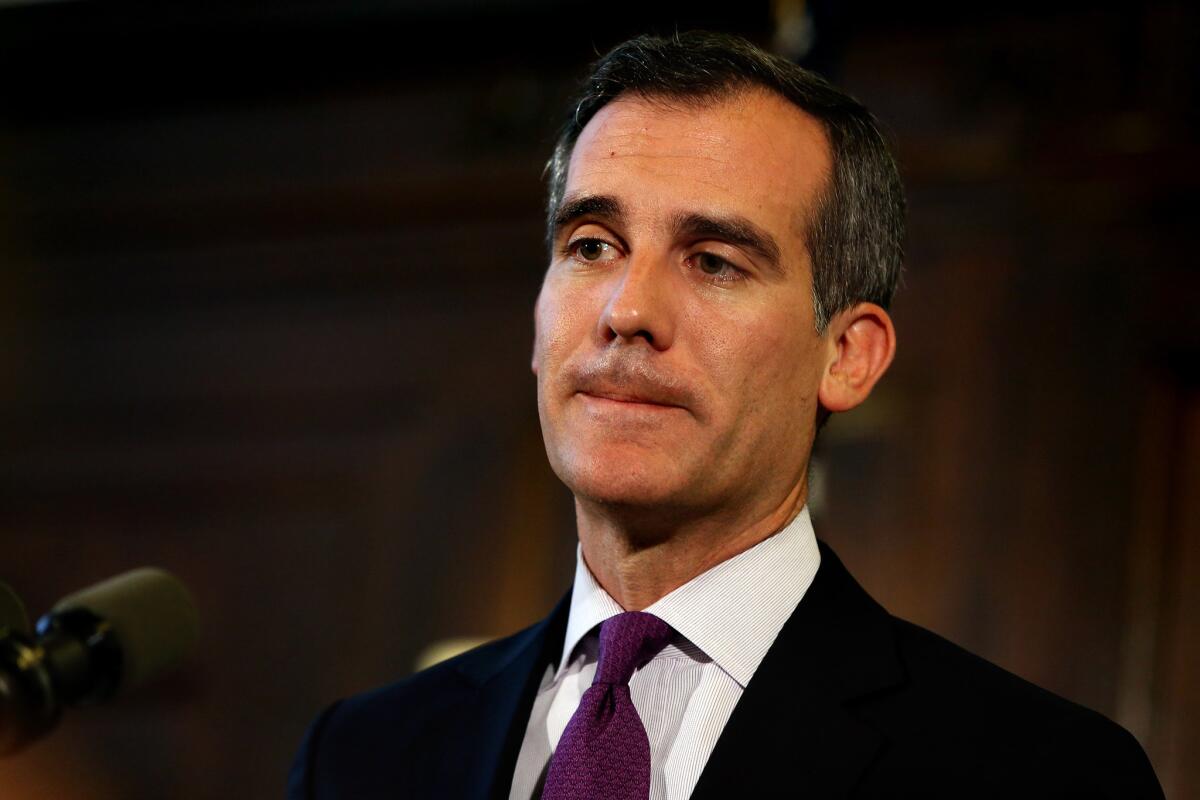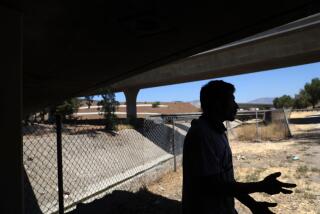Garcetti shifts stance, won’t enforce tough new homeless measures

Los Angeles Mayor Eric Garcetti, speaking at City Hall in early June, said Tuesday he would refuse to sign two new ordinances cracking down on homeless people and would block their enforcement until certain provisions are softened.
Mayor Eric Garcetti backed off controversial legislation targeting homeless encampments, saying late Tuesday he would not stop the measures from becoming law but would block enforcement until the City Council softens some provisions.
Garcetti had originally said he supported the laws, passed by the council last week, which would make it easier to seize and destroy homeless people’s belongings on sidewalks and in parks.
“I strongly support the enactment of laws that enable the city to ensure that public areas are clean and safe,” he said in a statement released by a spokesman. But Garcetti said he decided the ordinances do “not adequately achieve the proper balance” between keeping the streets clean and protecting the rights of people “who have no other choice but to live on them.”
The ordinances — one for sidewalks, the other for parks — give homeless people 24 hours to move their possessions or face having them seized. The city could destroy “bulky” or hazardous items and store the rest for 90 days. The only city storage facility is on skid row. Violators could be ticketed or charged with a misdemeanor.
Proposed amendments would, among other changes, drop the misdemeanor penalty, eliminate medications and documents from the list of items that could be impounded and spell out when property is considered unattended.
Retired UCLA law professor Gary Blasi said that the proposed amendments are “purely cosmetic” and that Garcetti cannot set policy for the Los Angeles Police Department, which reports to Chief Charlie Beck and ultimately to the Police Commission.
“It wouldn’t change the practical effect at all,” Blasi said. “When a homeless person is cited and doesn’t pay the fine, it goes to warrant and he faces arrest down the road.”
Blasi co-wrote an opinion piece about the ordinances that ran Tuesday in The Times accusing the city of embracing a policy of “force and intimidation” that was “guaranteed to fail.”
“Violators face the loss of nearly everything they own, criminal prosecution, jail and fines they cannot pay with money they do not have,” Blasi wrote, with Philip Mangano, who served as homelessness czar under President George W. Bush.
“What makes the local government’s inaction especially galling is that Los Angeles has done less than most major cities to end homelessness,” they wrote.
Blasi, a longtime researcher and advocate on homeless issues in Los Angeles, helps lead a partnership with the U.S. Department of Veterans Affairs that seeks to end veteran homelessness in the city. Garcetti pledged a year ago to get every homeless veteran off the L.A. streets by the end of 2015.
In his statement, Garcetti noted that the City Council had asked its new committee on homelessness to consider the amendments. The council, Garcetti said, stated that the amendments would “enable smarter law enforcement, more compassionate treatment of homeless Angelenos and strengthen the city’s ability to withstand legal challenge.”
“To date, neither the committee nor the full council has had an opportunity to consider and vote on amendments to accomplish these purposes,” Garcetti said.
The city has suffered a long string of courtroom defeats over its policies toward homeless people, including the confiscation and destruction of their property.
The city of Los Angeles has 26,000 homeless residents, an increase of 12% over two years. Los Angeles County has the most homeless veterans in the country, and two-thirds of them, or 2,733, live in the city. The city’s homeless veteran population rose 6% in the last two years.
Twitter: @geholland
More to Read
Sign up for Essential California
The most important California stories and recommendations in your inbox every morning.
You may occasionally receive promotional content from the Los Angeles Times.










